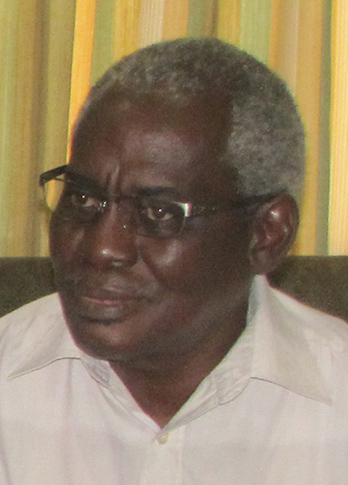
Robeson Benn
January 23 2019
With a 90-day constitutional clock ticking, the Guyana Elections Com-mission (GECOM) has mandated Chief Election Officer (CEO) Keith Lowenfield to prepare a report of possible scenarios with timelines for the holding of general and regional elections for discussion tomorrow when the commission meets again.
“At the commission-level, we have to get a report from the Secretariat. We put a system in place whereby the CEO will prepare that report for us. Hopefully, we have it within 24 hours. We are meeting again on Thursday morning to go through that report. He will come with the vagaries that will affect the readiness for the elections,” PPP/C-nominated commissioner Sase Gunraj told Stabroek News.
GECOM yesterday held its first statutory meeting since local government elections were run off on November 12th last year. Its Chairman, retired judge James Patterson, who had been on several weeks of sick leave, suspended the agenda to deal with matters pertaining to the national and regional elections, which could be held sooner than anticipated after a no-confidence motion against the government was carried on December 21st, 2018. Several legal challenges have since been mounted to the vote.
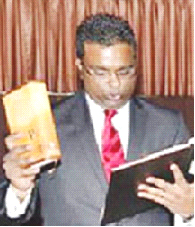
Five of the six commissioners nominated by government and the opposition yesterday spoke with the media outside the GECOM head office in Kingston after the meeting.
Following tomorrow’s discussions on the various timelines in respect of when elections could be held, PPP/C-nominated commissioner Robeson Benn said, “Thereafter we will be in a better position with respect of the meeting with the chief whips.”
There was no documentation which, he said, could have been used to advance a meeting immediately with the chief whips. “We only got a letter today, which the Chairman had written in reply to Ms Amna Ally (Government chief whip). She had written the chairman on the 10th January pointing out the need for a meeting and he replied on January 14th. Unfortunately we only saw that letter today,” he said.
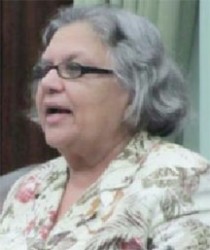
Following a meeting between the government and opposition, the Chief Whips were asked to enquire into GECOM’s operational readiness to deliver elections.
PPP/C-nominated Commissioner Bibi Shadick said that the commission will be looking for optimum time or the shortest possible time that elections could be held so it can deliberate on those and come to some kind of decision.
“We are working with the fact that there is a valid list up to the 30th April. If the CEO gives a timeline – not dateline – that is necessary for everything, to procure this and to procure that, and that timeline will take us beyond the 30th April, then he will have other things that may have to be done and how quickly those things could be done,” she added.
Asked about house-to-house registration being proposed by other commissioners, Shadick said, “I don’t think that could be accommodated before these elections. If that has to be accommodated, then we are saying to the constitution, ‘Go wherever you want. We are doing what we want.’
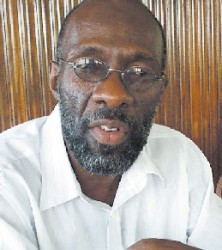
The thing is, these are abnormal circumstances. So we have to deal with it in a different but professional way.”
She added, “His Excellency [President David Granger] is waiting for that advice before he calls elections.”
‘House-to-house registration’
Meanwhile, on his proposal for a national house-to-house registration exercise, government-nominated commissioner Vincent Alexander said apart from his advocacy for house-to-house registration at this time, he was also aware of an institutional decision taken years ago that house-to-house registration should be held every seven years.
“That we haven’t had it means we do not have what is considered to be the best list. That we don’t have what is considered to be the best list has been a collective view expressed by commissioners,” he said.
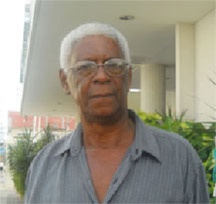
The difference has been in how best to get the dead off the voter’s’ list, he said. While the General Register Office sends the list of the registered dead and they are taken off the list, he said, the names of some deceased appear on the list because their deaths were not registered.
The country’s population is 740,000 yet there are some 500,000 names on the voters’ list, he said. “It is clear that the list is in excess of the resident voters. In my view, that allows for the elections to be corrupted in the sense that political people can use the excess to manipulate voting and have a result which is not reflective of the resident Guyanese. So we need to deal with that,” he added.
Whether it is an emergency election or a routine election, he said, “One needs to have the best voters’ list. Since we do not have the best voters’ list, it is not an issue we could ignore at this point in time.”
Asked if there are not sufficient safeguards at present to prevent the manipulation of the excess number of names on the list, Alexander said, “My own involvement in the political landscape tells me that I need to err on the side of caution.”
House-to-house registration was not raised at yesterday’s meeting, he said, “but at the appropriate time I will put it on the table.”
The constitution, he said, is a “very responsive” one and it provides that elections must be held within 90 days or at any such time as may be determined according to Article 106 (7). “So, if we have reasonable and logical people discussing the matter, it is not a matter of just 90 days. It is a matter that is considered to be a reasonable time in the circumstances,” he added.
Article 106 (7), he said, is unambiguous and people who have a mantra of 90 days are turning a blind eye to all the provisions of the constitution. “The constitution has anticipated the possibility that it cannot be done in 90 days,” he said.
Asked if after the next meeting, there is a possibility that the three government-nominated commissioners will stick to a position of holding house-to-house registration before the next elections, Alexander said, he cannot speak for the others, but that was his position.
Government-nominated commissioner Desmond Trotman said house-to-house registration was needed to legitimise the process. “I do not want to have what we had been having in previous elections. After the elections, there are some factions in the society who find the results unacceptable. For me, the one way in which you can guarantee that you will cleanse some of the impurities that exist on the present list is by doing a new house-to-house registration,” he said.
Asked about claims that government was using GECOM to delay the elections, Alexander said, “I will give a logical and rational reason for any proposition I make. After that, I can live with what is said because it is par for the course in politics.”
Trotman said he was not being manipulated and he will not accept any instructions except to represent the people’s interest at GECOM. “I do believe that in representing the people’s interests, one of the things I will continue to argue for is a new house-to-house registration, which at the end of the process will reflect acceptability by everybody.”
